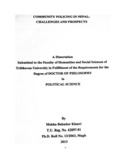Please use this identifier to cite or link to this item:
http://archive.nnl.gov.np:8080/handle/123456789/132| Title: | Community policing in Nepal : challenges and prospects |
| Authors: | Khatri, Mekha Bahadur |
| Keywords: | Community policing Nepal Police Organization |
| Issue Date: | 10-Jun-2018 |
| Abstract: | This research examines the concept and practice of community policing on the basis of descriptive and analytical methods applying both qualitative and quantitative approaches. This dissertation analyzes the theoretical background focusing on community, police, and community policing. This study includes historical development and its different models and practice of community policing especially in Britain, the USA, Japan, Singapore, China, and India and comprehensive historical review of the Nepal Police Organization then community policing in Nepal. The focus of this study was to understand the community policing in Nepal and its challenges and future prospects of community policing. To address the questions and hypothesis of this dissertation, qualitative and quantitative data have been collected through interview, field visit, and survey with police leaders, community police, committee members of community police service centers, civil society, local officials, private agencies, businessmen, and media. This dissertation shows the challenges of community policing in Nepal are socio-cultural, political, organizational, legal, and economical and these challenges get escalated because of lack of understanding of community policing philosophy or concept, citizens’ negative attitude towards the police, lack of national and organizational policies on community policing, lack of organizational support to implement community policing. The community policing in Nepal is established as an isolated add-on to existing police functions rather than an organizational change effort embracing the institution of police. The police leaderships have been facing many challenges—traditional recruitment and training system, resistance to change, traditional evaluation and assessment system, political interference, and resource limitation—for transforming police organization into community policing system. The police corruption, use of excessive force, undue behavior of police personnel have fueled the negative attitude of the public towards police, loss of trust trust and low morale of police personnel and ultimately increase in crime rates, fear of crime, and social disorders. These increased levels of challenges of community policing limit the future prospects of community policing. This dissertation anticipates the future prospects of community policing which include need of community policing, formation of national and organizational policies on community policing, formation of police commission, intra-organizational change, inter-agency cooperation and coordination, emphasis on training of community policing, allocation of resources, and establishment of inspectorate for assessment, monitoring, and inspection of policing as the future path for successful implementation of community policing in Nepal. If the future path is built successfully, the effects of successful implementation of community policing reduce crime, fear of crime, social disorder, and neighborhood decays; improve partnership and community perceptions toward the police; increase community capacity to deal with local issues; change police personnel’s attitude and behaviors; and, finally, increase safety and security in the community. The findings of data analysis show that the police and the community have an understanding of community policing but they do not equally understand community policing concepts. The next finding presents that Nepal police organization has not fully supported to implement community policing and it is suggested that the police organization must support to adopt community policing. The last finding provides that the challenges and prospects of community policing are interrelated. If the challenges of community policing increase, then the prospects of community policing decrease. The findings along with possible policy implications and directions for future research are discussed. |
| Description: | A dissertation submitted to the Faculty of Humanities and Social Sciences of Tribhuvan University in fulfillment of the requirements for the degree of Doctor of Philosophy in Political Science, 2013. |
| URI: | http://103.69.125.248:8080/xmlui/handle/123456789/132 |
| Appears in Collections: | 300 Social sciences |
Files in This Item:
| File | Description | Size | Format | |
|---|---|---|---|---|
| 65-Dr. Mekh Bahadur Khattri.pdf | 5.98 MB | Adobe PDF |  View/Open |
Items in DSpace are protected by copyright, with all rights reserved, unless otherwise indicated.